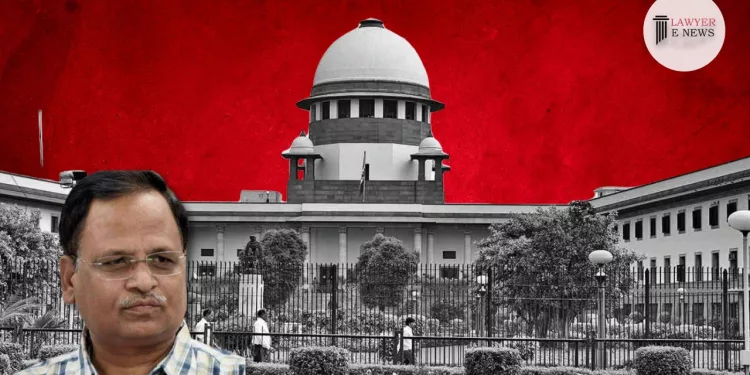Bail Dismissed | Evidence On Record Vaibhav and Ankush Jain Assisting APP Ex Minister Satyendar Kumar Jain In of Money Laundering: Supreme Court

The Supreme Court, in a landmark ruling on March 18th, 2024, upheld the denial of bail to Satyendar Kumar Jain, Ankush Jain, and Vaibhav Jain, in a high-profile money laundering case. The Bench, comprising Justices Bela M. Trivedi and Pankaj Mithal, meticulously evaluated the involvement of the appellants in activities defined as money laundering under Section 3 of the Prevention of Money Laundering Act (PMLA), 2002. The judgment clarified the scope of money laundering offences, stating, “Mere possession of undisclosed income, irrespective of its volume, does not automatically attract the definition of ‘proceeds of crime’ unless linked to a scheduled offence.”
Factual Background
An FIR was registered against Satyendar Kumar Jain, a Minister in the Government of National Capital Territory of Delhi, and others, for offences under the Prevention of Corruption Act, 1988. Following this, the Directorate of Enforcement initiated an investigation under the PMLA, alleging that Jain, with the help of family and others, laundered tainted cash through shell companies. Jain and others were arrested in 2022, and their bail applications were subsequently rejected by the High Court.
Court’s Assessment
Scope and Definition of Money Laundering: The Supreme Court highlighted the broad ambit of Section 3 of the PMLA, emphasizing that not every instance of undisclosed income equates to money laundering. It clarified that money laundering, as defined under the Act, encompasses activities directly or indirectly linked to the proceeds of crime from a scheduled offence.
Analysis of Beneficial Ownership: The court scrutinized the intricate shareholding patterns and control dynamics of various companies implicated in the case. It established that Satyendar Kumar Jain, through his family, effectively owned or controlled these entities.
The bench specifically noted that Jain was the architect of the accommodation entries amounting to Rs. 4.81 crores, thus directly implicating him in the process of laundering money.
False Declarations Under IDS: Ankush Jain and Vaibhav Jain’s false declarations under the Income Declaration Scheme (IDS) 2016 were critically examined. The Court found that these declarations were made to protect Satyendar Kumar Jain, thereby directly assisting in the laundering process.
The Court noted that these acts of misrepresentation significantly contributed to the laundering scheme, illustrating a clear chain of actions from concealment to projecting assets as untainted.
Inconsistencies in Proceeds of Crime Calculation: A pivotal point in the judgment was the Court’s observation on the discrepancies between the amounts calculated by the ED and those mentioned by the CBI in the predicate offence.
Despite these discrepancies, the Court concluded that the overall evidence pointed towards the appellants’ involvement in laundering activities.
Application of PMLA Provisions: The Court rigorously applied the twin conditions under Section 45 of the PMLA, which require proving that the accused is not likely guilty and won’t commit any offence while on bail.
Based on the evidence presented, the Court found that the appellants failed to meet these conditions.
Interpretation of Beneficial Ownership and Control: The Court delved into the concept of ‘beneficial ownership,’ concluding that Satyendar Kumar Jain, despite not being a direct shareholder or director during the check period, still exerted substantial control over the companies involved.
Admissibility and Weight of Evidence: Statements and documents submitted under Section 50 of the PMLA were deemed admissible and pivotal in forming the basis of the Court’s decision.
The Court treated these as substantive evidence of the appellants’ involvement in the laundering process.
Decision: The Supreme Court dismissed the appeals, finding the appellants prima facie guilty of money laundering as defined under Section 3 of the PMLA. The appellants failed to satisfy the stringent conditions for bail under Section 45 of the PMLA. The ruling highlights the need for clear evidence linking undisclosed income to a scheduled offence for it to be considered ‘proceeds of crime’ under the PMLA.
Date of Decision: March 18, 2024
Satyendar Kumar Jain & Ors. Vs. Directorate of Enforcement






